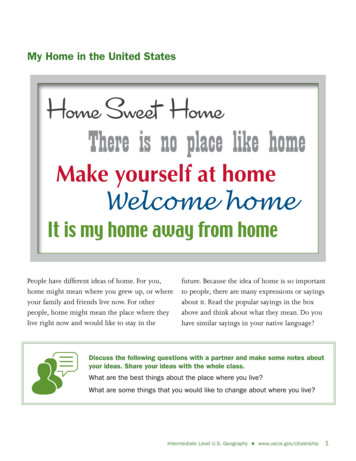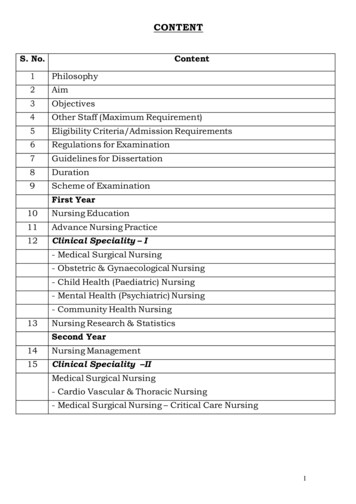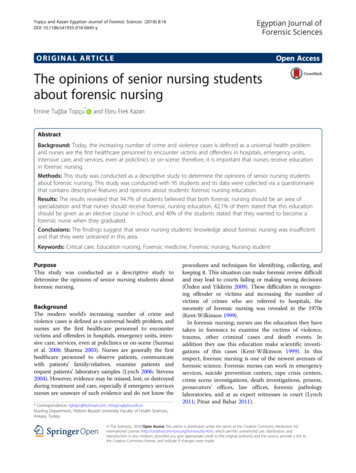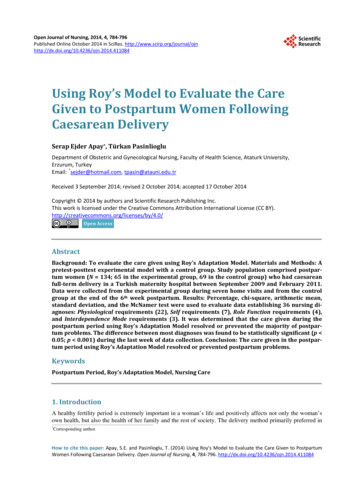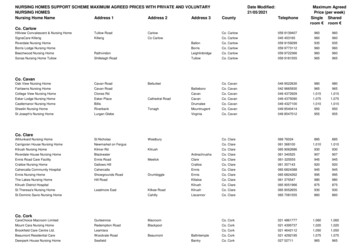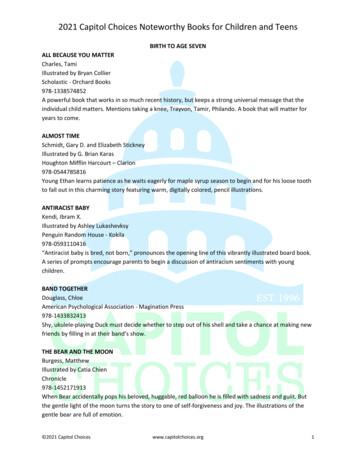
Transcription
LifeChoicesMake important decisionsnow about your end-of-lifeneeds. Your loved oneswill not have to makethose decisions for youif you become impaired.Forms are included tocommunicate your wishes.
With knowledgecomes choicesDear Missourians,As Attorney General, Iwork to protect the interests ofMissourians in all aspects of life.This includes health care decisionsand matters surrounding the end oflife.My office partnered with theMissouri End-of-Life Coalitionto empower Missourians withknowledge about end-of-life issuesand to raise awareness about painand symptom management.This revised edition of LifeChoices makes improvementsto an already popular publicationthat has been provided to tens ofthousands of Missourians.You may have signed a living willyears ago. Changes in the law makethe advance directives form on page15 of this booklet more effectivethan a living will, so I encourageyou to complete the form.Talk with your family, health careproviders and clergy about howyou wish to spend the end of yourlife. By communicating openly, youwill improve the quality of life foryourself and for your family.3The Office of the Missouri Attorney General is an equal opportunity employer.
Inside Life ChoicesCHAPTER 1PAGE 79131314152122222324Communicating about the end of lifeLife planning work sheetAdvance directives Durable power of attorney for health care choices Health care choices directive Durable power of attorney for health care choicesand health care choices directive formLiving willsUnderstanding life-sustaining treatmentsManaging your pain is possibleOutside the hospital do-not-resuscitate (OHDNR) orderHospice careCHAPTER 2PAGE 252626272727272828292929Financial considerationsWills Self-proving clausePersonal representativeWho receives your estateLiving trustsNon-probate transfersReal estate transfersPower of attorneyDurable power of attorneyPersonal custodianGuardianship and conservatorshipCHAPTER 3PAGE 303133333536When your loved one diesPaying for the funeralFuneral arrangements Right of sepulcherFinancial mattersOrgan and body donationCHAPTER 4PAGE 394041ResourcesFind more information about advance care planningTerms5
Communicatingabout the end of lifeCHAPTER 1PAGE 913131415212222222323232424Life planning work sheetAdvance directives Durable power of attorney for health care choices Health care choices directive Durable power of attorney for health care choicesand health care choices directive formLiving willsManaging your pain is possibleUnderstanding life-sustaining treatments CPR Respirator/ventilator Artificial nutrition and hydrationOutside the hospital do-not-resuscitate (OHDNR) orderHospice care Choosing hospice careCOMMUNICATING ABOUT THE END OF LIFE7
Communicatingabout the end of lifeIt’s often difficult to think aboutdying, let alone talk about it. Butthe only way to ensure your wishesare fulfilled is to communicate withclergy, family and physicians.Putting your wishes in writingcan relieve a tremendous burden foryour loved ones. Imagine the stressand sadness your family membersmay experience when you becomeinjured or ill. Now imagine theadded burden on them if you havenot communicated your wishes.Having these importantconversations now will saveheartache down the road.The way in which you want todie is a very personal decision.Begin by thinking about yourpersonal feelings about your death.A work sheet to help you startson page 9. Research your options.Talk with your health care provider,minister and family.Once you have a clear pictureof your wishes, share them withyour family, friends and doctor.An excellent way to communicateyour wishes is to complete anadvance directives form on page15. It includes a durable power ofattorney for health care choices andhealth care choices directive.This document should not beconstrued as legal advice or as anendorsement of any particular form.While the form in this booklet can8LIFE CHOICESbe completed without using anattorney, you may wish to consult aprivate attorney.Keep in mind that even thoughyour wishes are in writing, it maybe difficult for others to understandthem. That’s why it is so critical totalk with your family. Having thisconversation will lessen the pain,doubt and anxiety for your lovedones as you near death.While there is no right way orright time to start a conversationabout the end of life with yourfamily, these tips may help you getstarted: Describe someone else’sexperience. Say your attorney urged you tohave the conversation. Use the work sheets in thisbooklet. Write a letter or make a tape orvideo describing your wishes.Have your family review itbefore you talk.Your family may resist havingthe conversation; it’s often difficultto contemplate the loss of a lovedone. Stand your ground about theimportance of talking about dyingand bring up the consequencesof putting off the conversation. Italso may help to have someone beyour spokesperson and lead theconversation. In the end, you allwill have greater peace of mind.ago.mo.gov
WORKSHEETLIFE PLANNINGNameDateCompleting this work sheet will give you a framework for thinking about what you want atthe end of life. Your agent may refer to this work sheet if you become unable to speak foryourself. Use more paper if you need more space. Please note, this is not a legal documentand does not have to be filled out to complete your advanced directives.My values, beliefs and prioritiesWhich family members and friends are you closest to?What do you need most for your physical or mental well-being? Being outdoors? Listeningto music? Being aware of your surroundings and who is with you? How important areseeing, tasting and touching to you?Are you spiritual or religious? Would you like a member of the clergy to be with you whenyou are dying?COMMUNICATING ABOUT THE END OF LIFE9
LIFE PLANNING WORK SHEET COntiNUEDHow would you like to be remembered? What kind of person have you tried to be? Whichaccomplishments are you most proud of?Are there cultural or ethnic beliefs and practices that are important to you?What fears do you have about dying?What would you like to tell your loved ones before you die?10LIFE CHOICESago.mo.gov
LIFE PLANNING WORK SHEET COntiNUEDSedation may be necessary to control pain that may accompany the end of life. Would youwant to be sedated even if it makes you drowsy or puts you to sleep much of the time?Would you be interested in hospice care?What would you like the last week of your life to be like? Who will be there? Where will yoube? What will you eat if you can eat? What would you like your last words or acts to be?How do you envision your memorial service or funeral? What songs would you like? Whichreadings? Who would you like to participate?Would you like to write a letter or make a taped message for your loved ones to open at afuture time? Who should receive the letter or tape?COMMUNICATING ABOUT THE END OF LIFE11
LIFE PLANNING WORK SHEET NOTES12LIFE CHOICESago.mo.gov
Advance directivesYou may become physically ormentally unable to communicateyour desires for medical care ifyou have an accident or become ill.Your family and doctors will betterunderstand your preferences if youhave expressed them in writing.One way to accomplish this isthrough an advance directives form(starting on page 15) that names adurable power of attorney for healthcare choices and includes a healthcare choices directive.It is important to remember thatyou have a constitutional rightto refuse any medical treatment,including those that prolong yourlife. You also have the right to nameanother person, called an agent, tomake health care decisions for youif you lose the ability to make yourown decisions.Advance directives allow you tostate exactly what treatments you door do not want if you are unable tocommunicate your wishes.Many people have livingwills and mistakenly believe thisdocument will communicate theirtreatment wishes in any situationin which they are incapacitated.Even if you already have a livingwill, you should consider creating ahealth care choices directive.Many living wills apply onlywhen you are near death and donot include the withdrawal orwithholding of artificial nutritionand hydration. Health care choicesdirectives address these issues andgive specific instructions.Is a lawyer needed?The six-page form included in thischapter is designed to be useddirectly by individuals and meets therequirements of Missouri laws.However, if you decide to usea lawyer, you can contact theMissouri Bar Lawyer ReferralService (there is a fee):Jefferson City: 573-636-3635St. Louis: 314-621-6681Kansas City: 816-221-9472Greene County: 417-831-2783Get forms onlineThe work sheet and form also canbe found on the Attorney General’sWeb site at ago.mo.gov under the“Forms” link at the bottom of thepage.The six-page advance directivesform will help you express yourwishes regarding the end of life.Durable power of attorney forhealth care choicesThe durable power of attorneyfor health care choices, includedin the first part of the form, allowsyou to appoint another person tomake health care decisions that youhave not specified in the health carechoices directive. The person youappoint, called your agent, also candecide what should be done withyour body after your death.You already may have a powerof attorney for business andfinancial matters. Many peoplechoose separate agents for businessand health care and make thisknown in separate documents.COMMUNICATING ABOUT THE END OF LIFE13
Your health care agent shouldbe someone who understands yourgoals and values and you trust tocarry out your wishes.You may choose a familymember, spouse, adult child orclose friend who is at least 18 yearsold. Your agent cannot be a doctor,an employee of a doctor, or anowner, operator or employee of ahealth care facility in which youlive, unless you are related. Makesure to ask the person whether he orshe is willing to act as your agent,and talk candidly about your wishesso there are no misunderstandings.Your agent may make decisionsfor you only if you are physically ormentally unable to do so yourself.Missouri law requires twodoctors to declare a personincapacitated, unless you specifyotherwise. The durable power ofattorney section on the form allowsyou to choose whether you wantone or two doctors to determinewhether an agent should makedecisions on your behalf.Health care choices directiveA health care choices directive,included in the second part of theform, allows you to provide clearand convincing proof of whetheryou want your life lengthened bymedical treatment.When you become unable tomake decisions or communicateyour wishes, your doctor and agentwill make decisions based on whatyou have expressed in the healthcare choices directive section ofyour form.14LIFE CHOICESGive out copies of directiveGive copies of the six-pageadvance directives form to yourdoctor, the agent (or agents)named in the durable powerof attorney section, and yourfamily, friends and clergy. Haveconversations with these peopleabout your health care decisionsand ask your doctor to put it inyour permanent medical record.Many people travel with copies oftheir advance directives form.You also can write the nameof your agent on the back of yourdriver’s license with a permanentmarker. But you still will need to fillout a form for the advance directiveto be recognized.If you have named an agent, onlythis person has the legal authority tomake health care decisions for you.Tell your family whom you havechosen as your agent. Your agentmay wish to talk with your familybefore making decisions.Health care providers and youragent must follow the directionsgiven in your advance directive.The only exception is if yourrequest would require a healthcare provider to break the law.A provider who does not want tofollow your directive must help youtransfer to a facility where youradvance directive will be honored.An advance directive stays ineffect until you die unless you cancelit. If you want to later make changesto your directive, simply initial anddate the changes in the margin ofyour advance directives form.ago.mo.gov
Durable power of attorney for health care choices& health care choices DIRECTIVE6-PAGEFORMPart I. Durable power of attorney for health care choicesI, , ,NameSocial Security numberappoint, ,NamePhoneAddressas my agent for health care choices when I am unable to make decisions or communicate mywishes. In the case the person above cannot serve as my agent, or if I am divorced from orlegally separated from the agent above, I appoint the person below:, ,NamePhoneAddressThis alternate agent may make health care decisions for me when I am unable to do so or tocommunicate my wishes.This durable power of attorney becomes effective when two physicians certify that I amincapacitated and unable to make and communicate health care choices.You may choose to have one physician, instead of two, determine whetheryou are incapacitated. If you want to exercise this option — allowing onephysician to determine whether you are incapacitated — initial here.COMMUNICATING ABOUT THE END OF LIFE15
Durable power of attorney for health care & HEALTH CARE DIRECTIVEPAGE2 of 6By completing this durable power of attorney, I authorize my agent to make all decisions forme regarding my health care. This includes the power to withdraw any type of health care,treatment or procedure, even if I may die in the process. I expect my agent to follow myhealth care choices directive. My agent has the power to: Consent, refuse or withdraw consent to artificially supplied nutrition and hydration. Make all necessary arrangements for health care on my behalf. This includes admittingme to any hospital, psychiatric treatment facility, hospice, nursing home or other healthcare facility. Hire or fire health care personnel on my behalf. Request, receive and review my medical and hospital records. Take legal action if necessary to do what I have directed. Carry out my wishes regarding autopsy and organ donation, and decide what should bedone with my body.My agent under this durable power of attorney will not incur any personal financial liability.The agent also should not be compensated for services performed for me. However, theagent shall be reimbursed for reasonable expenses that are part of my care.THIS IS A DURABLE POWER OF ATTORNEY AND THE AUTHORITY OF MYATTORNEY IN FACT, WHEN EFFECTIVE, SHALL NOT TERMINATE OR BE VOIDOR VOIDABLE IF I AM OR BECOME DISABLED OR INCAPACITATED OR IN THEEVENT OF LATER UNCERTAINTY AS TO WHETHER I AM DEAD OR ALIVE.16LIFE CHOICESago.mo.gov
Durable power of attorney for health care & HEALTH CARE DIRECTIVEPAGE3 of 6Part II. Health care choices directiveI want those involved in my health care to understand my wishes if I cannot communicate ormake decisions on my own. I make this directive to provide clear and convincing proof ofmy wishes and instructions about my health care and treatment.If my doctor believes medical treatment will lead to my recovery, I want to have thetreatment. I also want to have care and treatment for pain or discomfort even if thistreatment might shorten my life, affect my appetite, slow my breathing or be habit-forming.If I have a terminal illness or condition and there is no reasonable hope I willrecover, or if I am persistently unconscious, I direct all of the life-prolongingprocedures I have initialed below to be withheld or withdrawn.I direct the following treatments to be withheld or withdrawn:Surgery or other invasive proceduresCardiopulmonary resuscitation (CPR) to restart my heart or breathingAntibioticsDialysisMechanical ventilator (respirator)Artificially supplied nutrition and hydration (including tube feeding)ChemotherapyRadiation therapyAll other “life-prolonging” medical treatments or surgeries that are merely intended tokeep me alive without reasonable hope of making me better or curing my illness or injury.I consent to the donation of my organs or tissues. I realize my body may need to bemaintained artificially after my death until my organs can be removed.I refuse to make anatomical gifts of part or all of my body. I prohibit my agent fromconsenting to such gifts before or after my death.COMMUNICATING ABOUT THE END OF LIFE17
Durable power of attorney for health care & HEALTH CARE DIRECTIVEPAGE4 of 6I also give the following directions regarding my health care:Optional: Describe what you consider an acceptable quality of life. For example, being ableto recognize my loved ones, make decisions, communicate or feed yourself.Attach extra pages if necessary. Sign and date the attached pages.Make sure to talk about this directive and your wishes with your agent, your doctors,family, friends and clergy. Give each of them a copy of the directive. Bring a copy withyou when you go to a hospital or other health care facility. Keep the original with yourimportant papers.18LIFE CHOICESago.mo.gov
Durable power of attorney for health care & HEALTH CARE DIRECTIVEPAGE5 of 6Part III. Relationship between health care choices directiveand durable power of attorney for health care choicesAs I have executed the health care choices directive and durable power of attorney forhealth care choices, I trust and encourage my agent to: First, follow my wishes as expressed in the directive or otherwise from knowledge aboutme or having had discussions with me about making choices regarding life-prolongingmedical treatment. Second, if my agent does not know my wishes for a specific decision, but my agent hasevidence of what I might want, my agent can try to figure out how I would decide. Thisis called substituted judgment and requires my agent imagining himself or herself in myposition. My agent should consider my values, religious beliefs, past choices and paststatements I have made. The aim is to choose as I probably would choose, even if it is notwhat my agent would choose for himself or herself. Third, if my agent has very little or no knowledge of what I would want, then my agentand the doctors will have to make a decision based on what a reasonable person in thesame situation would decide. This is called making decisions in my best interest. I haveconfidence in my agent’s ability to make decisions in my best interest if my agent doesnot have enough information to follow my preferences or use substituted judgment, and ifthis is the case, I authorize my agent to make decisions that might even be contrary to mydirective in his or her best judgment. Finally, if the durable power of attorney for health care choices is determined to beineffective, or if my agent is unable to serve, the health care choices directive is intendedto be used on its own as firm instructions to my health care providers regarding lifeprolonging procedures.COMMUNICATING ABOUT THE END OF LIFE19
PAGE6 of 6Durable power of attorney for health care & HEALTH CARE DIRECTIVESign this form before two witnesses who are not related to you or financially connected to your estate.IN WITNESS THEREOF, I have executed this document on , .MONTHDAYYEARSignaturePrint name SS No.AddressThe person who signed this document is of sound mind and voluntarily signed this documentin our presence. Each of the undersigned witnesses is at least 18 years of age.Signature SignaturePrint namePrint nameAddressAddressNotarization requiredSTATE OF MISSOURI)) SSCOUNTY OF )On this day of , in the year of , personally appearedbefore me the person signing, known by me to be the person who completed this documentand acknowledged it as his/her free act and deed.IN WITNESS WHEREOF, I have set my hand and affixed my official seal in the County of, State of Missouri, the day and year first above written.Notary public’s signature20LIFE CHOICESago.mo.gov
Living willsBy creating a living will, you instruct health care providers to withholdor withdraw medical treatment under certain circumstances. Missouri lawauthorizes the creation of living wills that use a statement or declaration inthis form:“I have the primary right to make my own decisionsconcerning treatment that might unduly prolong the dyingprocess. By this declaration I express to my physician,family and friends my intent. If I should have a terminalcondition it is my desire that my dying not be prolongedby administration of death-prolonging procedures. If mycondition is terminal and I am unable to participate indecisions regarding my medical treatment, I direct myattending physician to withhold or withdraw medicalprocedures that merely prolong the dying process andare not necessary to my comfort or to alleviate pain. It isnot my intent to authorize affirmative or deliberate actsor omissions to shorten my life, rather only to permit thenatural process of dying.”To create a living will, youmust be 18 or older and have twowitnesses who also are at least18 years old. You and your twowitnesses must sign the living will.The witnesses cannot be familymembers, beneficiaries to yourestate or financially responsible foryour medical care.Living wills do have limitations.They apply only to near deathsituations in which the patientwill die shortly without medicalintervention. Missouri law prohibitsa living will from being used towithhold or withdraw artificiallysupplied nutrition and hydration.To give instructions beyond whata living will allows, complete theadvance directives form that startson page 15.Once you complete a living will,make sure to give copies to yourdoctors, family members and theperson you have chosen as yourpower of attorney for health care.If you decide you want to cancelyour living will, you can do soeither verbally or in writing. Healthcare providers are required to notea revocation of a living will in yourmedical record.COMMUNICATING ABOUT THE END OF LIFE21
Understanding life-sustaining treatmentsYour doctor can answeryour questions about the typesof treatments and medicalinterventions that may lengthenyour life and delay death.Understanding these treatmentsand interventions will help youcreate your advance directives. Lifesustaining treatments are describedbelow. However, your doctor maymore fully explain them to you.Cardiopulmonary resuscitationCPR is performed when the heartor lungs suddenly stop working. Itusually includes chest compressions,administration of drugs and/or electric shock to restore theheartbeat, and a tube placed in thewindpipe for breathing.Managing your pain is possibleYou should not have to live inpain, which is the No. 1 reasonpeople seek medical care. Insiston getting the relief you need bytalking with family and healthcare providers.You are not alone if you aresearching for ways to controlyour pain. Pain management isa major concern for people withserious illnesses or injuries. In a1999 Gallup survey, nine out of10 Americans said they sufferedpain at least once a month, and42 percent reported feeling painevery single day.Unrelieved pain can becrippling: if you are in painyou may become depressed,have trouble sleeping, fall, havetrouble thinking clearly, lose yourappetite and lose the ability tomove around.Doctors now have the toolsto relieve pain for more than 90percent of patients. Yet, research22LIFE CHOICESshows many people do notreceive the pain relief they need,especially residents in nursinghomes. One study found 26percent of nursing home residentswho have daily pain receive nopain medication.Some patients refuse narcoticpain relievers because theyfear they will become addicted.However, doctors say addictionis rare when pain medication isprescribed and used properly.Fear of addiction should not keepyou from using pain relievers.You may choose to make yourwishes known regarding painmanagement in a written advancedirective. See page 17.You also can call upon hospicecare teams specially trained inmanaging pain to work on yourbehalf. You may have to speak upfor yourself more than you wouldlike; just remember, pain relief isyour goal and it is possible.ago.mo.gov
A doctor sometimes will writea do-not-resuscitate (DNR) orderinstructing health care providers notto attempt CPR in the case of cardiacor respiratory arrest. In contrast toadvance directives, the patient orhealth care agent cannot prepare theDNR order.Every health care facility has itsown policy on when to use DNRorders. Emergency medical serviceshave separate forms. Check withyour local ambulance service andhospital for information.Respirator (also called a ventilator)This machine breathes for aperson unable to breathe naturallyby moving air into the lungs.Patients recovering from surgery orillness sometimes are placed on aventilator to help them breathe untilthey can breathe on their own.Artificial nutrition and hydrationA patient who is unable to eator drink may receive nutrition andfluids directly or indirectly into hisor her stomach by a feeding tube orthrough an intravenous line. Thisartificial method of nutrition andhydration ordinarily is used when aperson temporarily loses the abilityto eat or digest food or water.Outside the hospital do-not-resuscitate orderSome people decide to leavethe hospital and die at home,whether it’s their own home, anursing home, hospice or otherfacility. Missouri law now allowsthese individuals to create a donot-resuscitate order. The ordermust be signed by the patient (orguardian) and a doctor, and it tellsemergency responders the patientdoes not want treatment to restartthe heartbeat or breathing.These orders have long beenallowed in hospitals, authorizedby doctors. Until 2007, however, ahospital was the only place wherethis was allowed.A scenario under the new law:an elderly hospitalized womanconfers with her doctors and learnsshe does not have much longer tolive. She decides to return home tospend her final days with family.Because she fully expects her heartto stop beating or her lungs to shutdown, she does not want to beresuscitated. So she and her doctorsign an outside the hospital do-notresuscitate (OHDNR) order.She keeps a copy of this format home and in her medical file.This form needs to be accessibleso that if someone does call 911,emergency responders know not toresuscitate. The patient can alwayschange her mind on the spot, lettingemergency responders know shedoes want to be revived.At the time of this printing, astandard form has not been created.Check with your doctor, lawyer orthe Missouri Department of Healthand Senior Services for guidance oncompleting an outside the hospitaldo-not-resuscitate order.COMMUNICATING ABOUT THE END OF LIFE23
Hospice careIn a recent survey, 70 percent of Americanssaid they would prefer to be cared for and dieat home, but in Missouri less than 30 percentof people spend their final days in their homes.In some cases, a hospital or nursing home isthe most appropriate place for a person to die,such as when advanced medical technologyis necessary. But most people who die inhospitals and nursing homes could die at homeif support were available.In recent years, more Missourians havehad the opportunity to die at home or in ahomelike setting because of hospice care.Hospice care focuses on relieving thesymptoms of persons who are dying ratherthan trying to cure them. Hospice acceptsdeath as a natural part of life.A team of care providers creates a plan forthe patient to control pain and allow them tolive life to the fullest until they die. The teamusually includes a doctor, nurse, counselors,clergy, volunteers and aides. Hospice care canbe provided wherever the patient calls home— the patient’s own home, a nursing home, ahospital, assisted living or a hospice facility.The hospice team addresses not onlyphysical symptoms, but also emotional,How to find a hospiceTo find a nearby hospice, contact the MissouriHospice and Palliative Care Association. Call: 816-524-9505 Click: www.mohospice.orgpsychological and spiritual needs. Thepatient’s family also receives care in manyways including respite care that gives familymembers and other caregivers a break.Counselors and social workers also spendtime with the family. This support continuesfor up to a year after the patient dies.Medicare, private health insurance andMedicaid usually cover the cost of hospicecare for eligible patients. To qualify, a patientmust have a life expectancy of six monthsor less and agree to forgo curative medicaltreatments. Many hospices receive donationsfrom the community and offer services basedon need, rather than a patient’s ability to pay.Studies show patients benefit mostfrom hospice care if they receive care forat least 60 days, thus getting the pain andsymptom management they need as well aspsychological and spiritual support. However,most patients receive hospice care for about36 days and many for one week or less.CHOOSING HOSPICE CARETo choose a hospice, begin by talking to people you trust who are familiar with areahospice programs. This may include your health care provider, minister and friends. Callrepresentatives of several hospices, if possible. Here are some questions to ask: What services do you provide? What kind of support do you give to the family or caregiver? What role does the attending doctor and hospice play? What do your volunteers do? How do you work to keep the patient comfortable? How are services provided after hours? How and where do you provide short-term inpatient care? Do you provide care in a nursing home or long-term care facility?24LIFE CHOICESago.mo.gov
FinancialconsiderationsCHAPTER 2PAGE 2626272727272828292929Wills Self-proving clausePersonal representativeWho receives your estateLiving trustsNon-probate transfersReal estate transfersPower of attorneyDurable power of attorneyPersonal custodianGuardianship and cons
Durable power of attorney for health care choices Health care choices directive Durable power of attorney for health care choices and health care choices directive form Living wills Understanding life-sustaining treatments Managing your pain is possible Outside the hospital do-not-resusc
